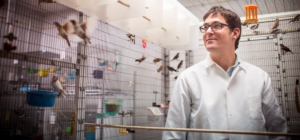Samuel Sober, Emory University – Learning From Mistakes
 It pays to learn from your mistakes.
It pays to learn from your mistakes.
Samuel Sober, assistant professor in the biology department at Emory University, explores which part of our brain helps us avoid making the same error twice.
I attended Wesleyan University, where I received a BA in Neuroscience & Behavior.
I did my doctoral research as an NSF Graduate Research Fellow with Philip N. Sabes at UCSF and was a Helen Hay Whitney Postdoctoral Fellow in the laboratory of Michael Brainard, also at UCSF.
I am presently an Assistant Professor in the Biology Department at Emory University in Atlanta, Georgia.
I am a member of Emory’s Neuroscience Graduate Program and the joint Emory/Georgia Tech Program in Biomedical Engineering.
Learning From Mistakes
Our brains are constantly learning from our mistakes. This is especially important in skilled behaviors such as speech, where the brain monitors the sound of our own voices and uses this information to correct errors in our vocal production. Songbirds perform similar feats of vocal learning, using sensory information to modify their songs in response to auditory inputs. Although we know a lot about how sound is processed by the nervous system, it remains a mystery how error signals are transmitted to the parts of the brain that control behavior.
Our laboratory recently used songbirds to test a hypothesis about how error signals are transmitted during vocal behavior. Bengalese finches are songbirds with extremely precise singing behavior and are highly sensitive to errors in auditory feedback. We used these birds to test the hypothesis that error signals are carried by the neurotransmitter dopamine within a small part of the songbird basal ganglia, a brain region known to be involved in learning. We tested the birds’ learning abilities by playing blasts of loud noise whenever birds sang within a particular range of vocal pitches. Over time, finches change the pitch of their songs to avoid these bursts of noise.
We found that experimentally reducing dopamine in a small part of the songbird’s brain did not interfere with the birds’ song performance or motivation to sing, but dramatically reduced the birds’ ability to change their songs to avoid auditory errors. Our results suggest that dopamine regulates vocal learning by transmitting error signals to the motor system. Our future work will examine how dopamine regulates patterns of brain activity during learning, and we hope to use this work to shed light on the learning deficits that can accompany neurological disorders in humans that alter dopamine function.


